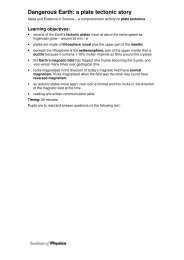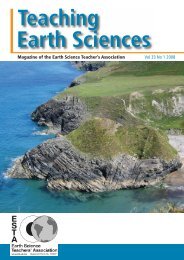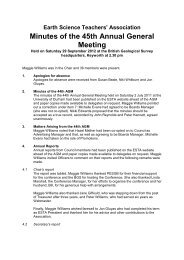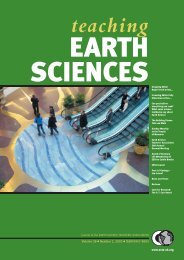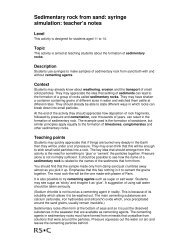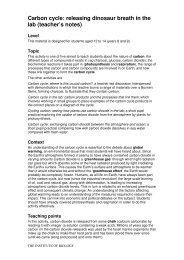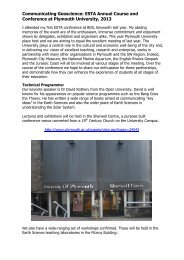Teaching Earth Sciences - Earth Science Teachers' Association
Teaching Earth Sciences - Earth Science Teachers' Association
Teaching Earth Sciences - Earth Science Teachers' Association
You also want an ePaper? Increase the reach of your titles
YUMPU automatically turns print PDFs into web optimized ePapers that Google loves.
Reviews<br />
The Control of Nature<br />
John McPhee<br />
Farrar, Straus & Giroux. 1990<br />
ISBN13: 978-0-374-52259-9 $9.46<br />
First published in<br />
1989, this book<br />
may not be a new<br />
addition to <strong>Earth</strong><br />
<strong>Science</strong> teachers’<br />
bookshelves but<br />
is nevertheless an<br />
engaging book<br />
that has charm<br />
and relevance to<br />
those interested<br />
in the engineering<br />
challenges faced<br />
in tackling some<br />
of man’s biggest<br />
battles with nature.<br />
It is of particular interest to those following the WJEC<br />
AS Geology specification (GL3 – Geology & the Human<br />
Environment).<br />
More of an historical account of events than a geological<br />
one, McPhee details the strategies and tactics through<br />
which people attempt to control nature and carries us to<br />
the front lines of the still-raging battle between man and<br />
nature.<br />
The book focuses on three key locations : Louisiana, on<br />
the lower Mississippi River, USA, where even today<br />
engineers are fighting a continuing battle with the river<br />
which threatens to follow a new route to the sea and cut<br />
off New Orleans and Baton Rouge from the rest of the<br />
United States; Iceland where inhabitants confront the red<br />
hot lava of the 1973 volcanic eruption in an attempt to<br />
save the crucial harbour of Heimaey, Westmann Islands;<br />
and Los Angeles, USA where basins are built to catch<br />
devastating debris flows from the San Gabriel Mountains.<br />
Unflinchingly honest, yet unashamedly editorial, the three<br />
long stories (or chapters) pit relentless nature against<br />
mankind in a clash of wills reminiscent of Greek tragedy.<br />
What emerges are tales of determination, folly and grim<br />
triumph; a modern mythology where nature supplies the<br />
gods and man plays himself at his imperfect best.<br />
If you have been lucky enough to visit the Westmann<br />
Islands, Iceland yourself, Chapter Two is perhaps of most<br />
interest. Here, McPhee brings to life the 1973 eruption and<br />
the people involved in the taming of the volcano – Eldfell.<br />
There are vivid comparisons made to Vesuvius in AD79,<br />
Hawaiian eruptions and the controlled bombing of Etna,<br />
Sicily by the military in an attempt to divert the devastating<br />
lava flows and save land and lives. McPhee’s research<br />
involves eye witness accounts and key quotes from those<br />
involved in the battle at the time. The stories are well told<br />
and bear witness to the ultimate resilience of the people of<br />
the Westmann Islands.<br />
McPhee doesn’t just write about science, he writes<br />
about people who apply and sometimes defy science in<br />
their struggle to control nature and protect themselves<br />
from the inevitable. Blending the best of Sunday-paper<br />
feature writing with the drama and insight of a novelist,<br />
he has produced a fascinating account of the struggle of<br />
the engineers in New Orleans, the Icelandic people on<br />
Heimaey and the head-in-the-sand mentality of Southern<br />
Californians when it comes to mudslides.<br />
I would recommend the book to any students of Geology,<br />
or indeed Geography but also to <strong>Earth</strong> <strong>Science</strong> teachers to<br />
gain a further insight into some of the major geological/<br />
historic events of the last 40 years. My only real criticism of<br />
the book is that whilst there are illustrations, there are no<br />
maps (or diagrams) in the book to put the locations into<br />
a geographical context and readers would have benefited<br />
greatly from such inclusions.<br />
Dawn Windley<br />
www.esta-uk.net Vol 35 No 1 2010 <strong>Teaching</strong> <strong>Earth</strong> <strong><strong>Science</strong>s</strong> 57



